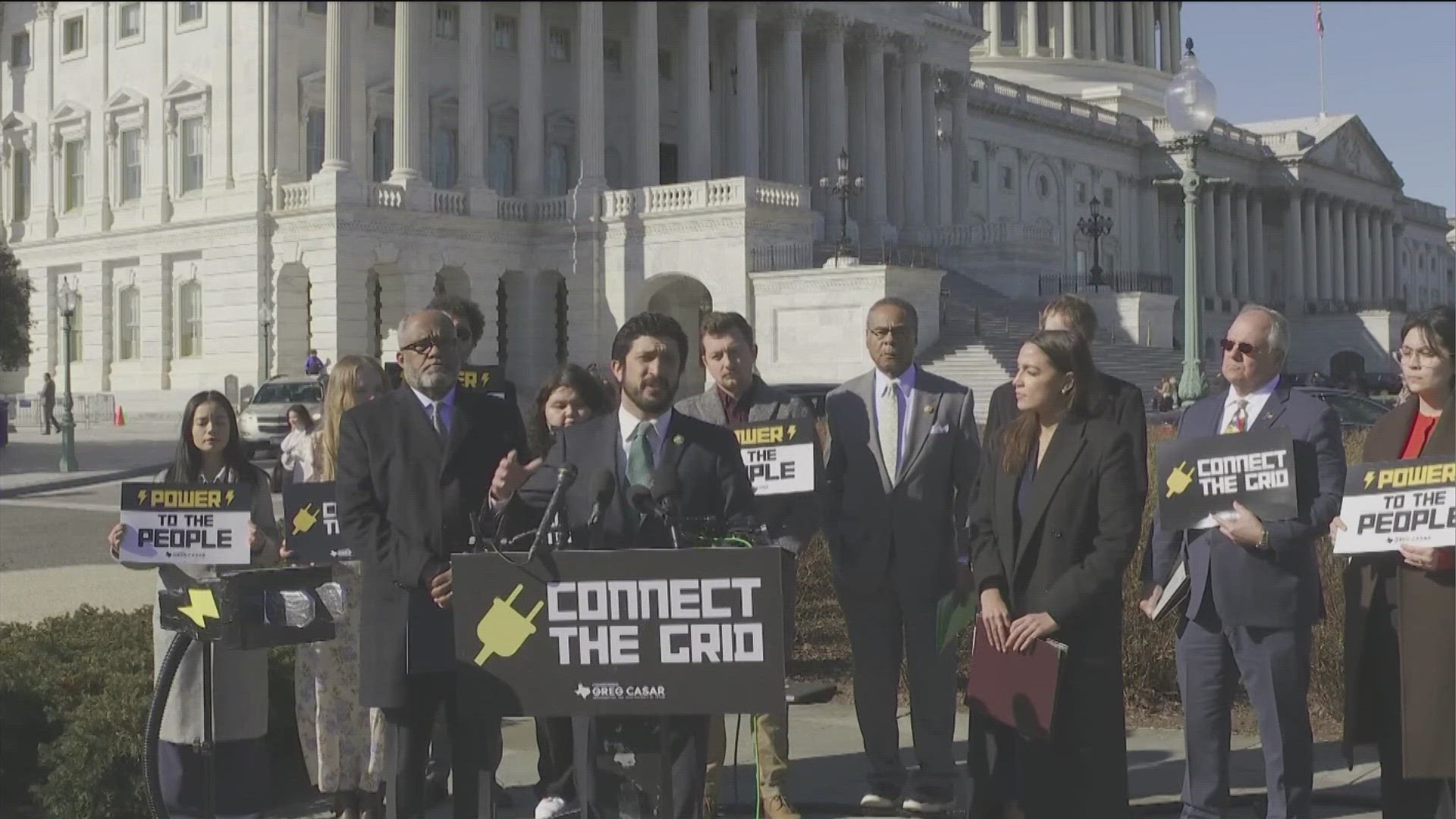TEXAS, USA — Democrats representing Texas in the U.S. House of Representatives will file legislation that would force Texas to connect its power grid to other states and limit ERCOT's control over the system's operation, the group announced Wednesday.
U.S. Rep Greg Casar, D-Austin, and U.S. Rep. Alexandria Ocasio-Cortez, D-New York, will sponsor the so-called "Connect the Grid Act" in the House.
The proposal comes three years after Winter Storm Uri, which prompted extended, rolling power outages across Texas. The state health department concluded nearly 250 Texans died during the freeze, mostly from hypothermia.
"They died, not just because of what happened on a climate level," Ocasio-Cortez said in a press conference Wednesday. "They died because of what happened on a structural and leadership level."
Casar said his bill would require interconnections that could transmit between 12 gigawatts and 36 gigawatts of electricity, enough to power between 3 million and 9 million homes on a hot day. Casar added the measure appropriates some money for construction of such transmission lines.
"If Texas is in trouble and we connect to the grid, we'll make sure that Texas can draw power from other states," Casar said.
The new transmission lines would also allow Texas power producers to sell electricity to consumers elsewhere, making the bill potentially lucrative to out-of-state lawmakers. Such a connection would likely lower power prices on the coasts, in congressional district's like Ocasio-Cortez's.
Texas is a national leader in renewable energy production. Interconnecting the ERCOT grid would allow users in other states to buy excess electricity generated by Texas's many solar farms and wind turbines.
"Connecting the grid would drastically reduce carbon dioxide emissions by making sure the sunniest and windiest parts of the entire county can actually provide clean energy across the United States and not just be isolated to Texas," Casar said.
But the bill would also strip ERCOT, the state's grid operator, of its regulatory authority. Connecting to the 'national grid' would subject Texas to federal requirements and laws ERCOT currently evades.
For decades, Texas lawmakers have argued ERCOT's independence is key to the state's relatively-low electricity bills.
"The good news is that Congress really never does anything about anything," state Rep. Jared Patterson, R-Frisco, told WFAA. "I seriously doubt this is going to get through, but we need our congressional delegation in Texas to stop this."
Patterson, who works in the electricity industry, blames current federal policy for some of Texas's grid problems. Government incentives for wind and solar, he says, have discouraged investment in natural gas and nuclear power and made Texas too reliant on energy sources that require fair weather.
"We already have the federal government overstepping into our electricity grid, currently," Patterson said.
Patterson pointed to rolling outages in California as proof states that are interconnected also experience problems related to electricity supply and demand.
"Additional import capability does not necessarily equate to greater reliability," an ERCOT spokesperson wrote in a statement to WFAA. "Many weather-related events are regional in nature and a weather event that is adversely affecting Texas is more than likely negatively affecting surrounding states resulting in a diminished capacity for ERCOT to import power from the neighboring grid."
The grid operator also noted potential implications for the state's electricity market, saying interconnection could have a potential "chilling effect on any new, native generation built in Texas."
"Developers could view an increased import capability from potentially less expensive markets as a significant disincentive to build new generation facilities in Texas," a spokesperson said. "Future generation could choose to site outside the ERCOT region with the aim of exporting into ERCOT... ERCOT would have less access to this new generation than if it had been built in Texas. This will be especially true during extreme weather conditions impacting multiple regions."
A spokesperson for the Public Utility Commission, which oversees ERCOT, said would be premature to comment on pending legislation that could change as it moves through Congress.
More than 26 million people rely on ERCOT for electricity or about 90% of the state’s electric load, the operator said in 2022. Notably, the small portions of the state that are connected to other states' grids did not lose power during Winter Storm Uri.
U.S. Sen. Ed Markey, D-Massachusetts, will carry Casar's bill in the Senate. Other Democratic Housemembers co-sponsoring the legislation include Dallas's Jasmine Crockett, San Antonio's Joaquin Castro, Austin's Lloyd Doggett, Houston's Sheila Jackson Lee, El Paso's Veronica Escobar, Houston's Sylvia Garcia, Houston's Al Green, Louisiana's Troy Carter, Illinois's Emanuel Cleaver, Florida's Maxwell Frost, California's Robert Garcia, Washington's Pramila Jayapal, Washington D.C.'s Eleanor Holmes Norton, California's Jared Huffman, Minnesota's Ilhan Omar, Illinois's Delia Ramirez, and Michigan's Rashida Tlaib.

